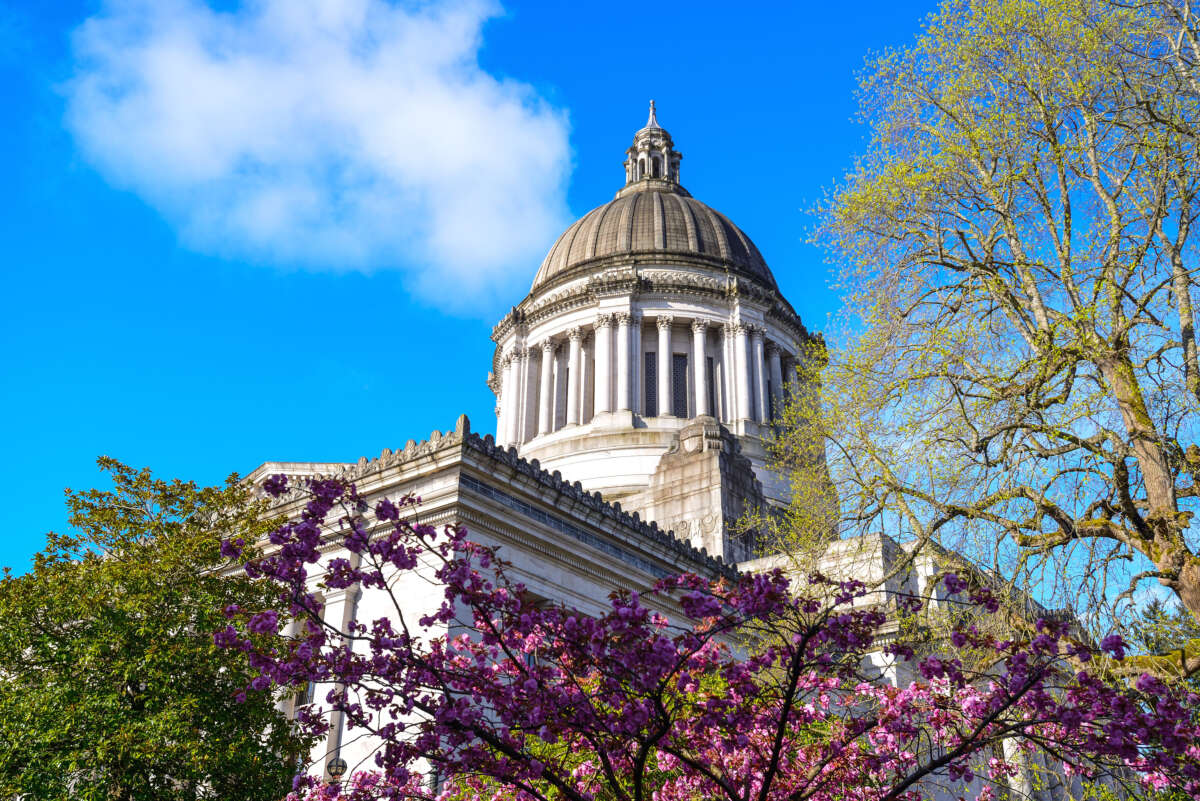Truthout is a vital news source and a living history of political struggle. If you think our work is valuable, support us with a donation of any size.
In response to far right lawmakers introducing a slew of anti-trans legislation over the past few months, a handful of states have moved to pass shield laws to protect medical providers and trans residents, as well as out-of-state visitors seeking gender-affirming care.
On April 10, Washington became the sixth state to pass a law protecting access to reproductive and gender-affirming health care within its borders, joining Massachusetts, California, the District of Columbia, Illinois, New Mexico, and Colorado. New Jersey Gov. Phil Murphy (D) and Minnesota Gov. Tim Walz (D) also responded to the onslaught of anti-trans attacks, signing executive orders declaring their states safe havens for refugees seeking gender-affirming care.
“The purpose of this bill is to ensure that those seeking care or those providing care for reproductive and gender-affirming care under the laws of our state are shielded from liability,” said Sen. Yasmin Trudeau (D). “Washington voters and this Legislature have been very clear on this issue — we support the right to that access, we also support anyone who comes into this state to receive that access.”
While Washington’s shield legislation has not yet been signed into law, Gov. Jay Inslee’s (D) is expected to sign the bill shortly. Inslee has supported trans-friendly legislation in the past and recently signed a measure that provides additional privacy to transgender people who pursue legal name changes, allowing trans people to request that their court records be sealed.
“Every single person should have the freedom to feel safe as their true authentic self…we see you and encourage you to come as you are,” Inslee told trans residents in a statement released on Trans Day of Visibility this month.
The Washington bill includes protection from civil proceedings and private rights of action, such as Texas’s abortion bounty hunter law, as well as protection of medical records and protection from wiretaps and disclosure of electronic records. It also ensures that people from out of state cannot be criminalized for seeking gender-affirming care or abortion services in Washington, and mandates that out-of-state requests for extradition and subpoenas for protected information be denied.
Trans advocates say that shield laws are especially critical as far right legislatures across the country pass bills barring access to gender-affirming care. According to the Movement Advancement Project, 14 states have banned best practice medication and surgical care for transgender youth, and the Human Rights Campaign has warned that half of trans youth have either already lost or are at risk of losing access to gender-affirming care in their state.
Missouri’s Attorney General Andrew Bailey (R), for example, just unilaterally restricted access to gender-affirming care for both youth and adults through an executive action so severe that the regulations will, in practice, amount to a full ban. While Lambda Legal and the ACLU of Missouri have vowed to sue to block the ban, the emergency rule may go into effect as soon as April 27.
“This is what elimination of transgender people looks like,” transgender activist and researcher Erin Reed wrote on Twitter in response to the ban.
Dozens of trans people in Missouri are terrified about what Bailey’s executive order could mean for their future, Reed said — and for some, the emergency rule could essentially be a death sentence.
Though traveling out of state for care may not be an option for everyone, shield laws will allow many transgender and nonbinary Missourians to seek gender-affirming health care in neighboring safe haven states, like Illinois. In some cases, Illinois practitioners may save their lives.
Holding Trump accountable for his illegal war on Iran
The devastating American and Israeli attacks have killed hundreds of Iranians, and the death toll continues to rise.
As independent media, what we do next matters a lot. It’s up to us to report the truth, demand accountability, and reckon with the consequences of U.S. militarism at this cataclysmic historical moment.
Trump may be an authoritarian, but he is not entirely invulnerable, nor are the elected officials who have given him pass after pass. We cannot let him believe for a second longer that he can get away with something this wildly illegal or recklessly dangerous without accountability.
We ask for your support as we carry out our media resistance to unchecked militarism. Please make a tax-deductible one-time or monthly donation to Truthout.
